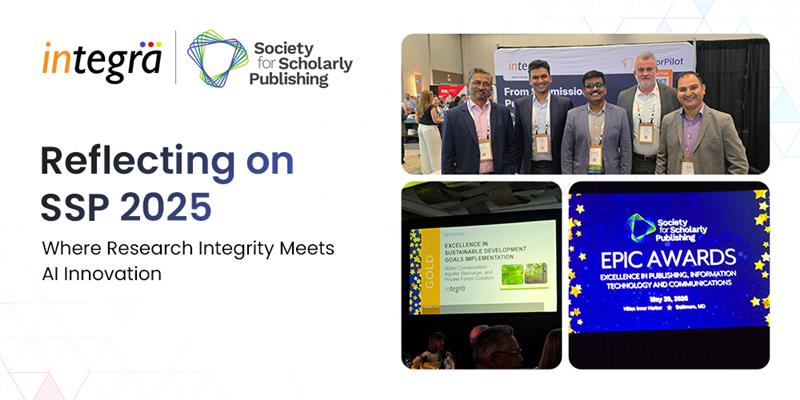
The 47th Annual Meeting of the Society for Scholarly Publishing (SSP) in Baltimore was nothing short of transformative. As we returned from three energizing days at the SSP Annual Meeting, I find myself reflecting on how this year’s conference theme—“Reimagining the Future of Scholarly Publishing at the Intersection of Value and Values”—perfectly captured the pivotal moment our industry finds itself in.
A Conference Defined by Purpose and Innovation
From our vantage point as Diamond Sponsor and exhibitor at Booth #306, we witnessed firsthand how the scholarly publishing community is grappling with two defining forces: the imperative for research integrity and the transformative potential of artificial intelligence. These weren’t just conference buzzwords—they were the threads that wove through every meaningful conversation, panel discussion, and networking session.
The energy was palpable from Day 1. Our team, flying in from three countries and four cities, immediately felt the pulse of an industry in thoughtful transition. The conversations we had weren’t just about what’s possible with AI, but about what’s responsible. They weren’t just about scaling operations, but about scaling with integrity.
Research Integrity: More Than a Checkbox
What struck me most about this year’s SSP was how research integrity has evolved from a compliance consideration to a competitive advantage. The exhibitor marketplace reflected this shift beautifully—from AI-assisted plagiarism detection tools to sophisticated image analysis platforms, the focus was on empowering editorial teams to scale integrity checks as submission volumes grow.
This resonated deeply with Integra’s mission. Our Research Integrity as a Service offerings—including AI-assisted tools for plagiarism detection, image analysis, and data validation—aren’t just about catching problems. They’re about enabling publishers to maintain the highest standards while managing the realities of increased submission volumes and faster publication cycles.
AI: From Hype to Practical Application
Perhaps the most refreshing aspect of SSP 2025 was how the AI conversation has matured. Gone are the days of speculating about AI’s potential impact—we’re now deep in the work of responsible implementation. The Oxford-Style Debate on “AI is Fair Use” during the closing plenary perfectly encapsulated this evolution, bringing legal, ethical, and practical considerations into sharp focus.
Our conversations at Booth #306 reflected this practical turn. Publishers weren’t asking whether to adopt AI, but how to do it thoughtfully. They wanted to understand how AI could support peer review without compromising editorial judgment, how to enhance content without replacing human expertise, and how to build custom solutions that serve their unique workflows.
This is precisely where Integra’s approach resonates. Our AI-powered solutions—from AuthorPilot for intelligent manuscript screening to EditPilot and LangPilot for integrated production workflows—are designed to augment human expertise, not replace it. We’re building tools that make editorial teams more efficient and effective, while preserving the critical thinking and judgment that defines quality scholarly publishing.
The Power of Values-Driven Business
One of the conference’s most meaningful moments came when we received the SSP EPIC Gold Award in the Sustainability category. This recognition wasn’t just about our environmental initiatives—our private forestry program with 34,000+ native trees, our water conservation efforts saving 41 million liters annually, or our LEED Platinum-certified campus running on 100% green energy.
The award represented something deeper: the scholarly publishing community’s recognition that sustainable business practices aren’t just good for the planet—they’re good for business. Our commitment to carbon neutrality by 2030 isn’t separate from our mission to advance scholarly communication; it’s integral to it.
Building Community Through Connection
Beyond the formal sessions and product demonstrations, SSP 2025 reinforced something fundamental about our industry: we’re a community. The New Member/First-Time Attendee Breakfast, the networking receptions, even the Board Game Night—these weren’t just social events. They were opportunities to share challenges, exchange ideas, and build the relationships that drive innovation.
Our team had countless conversations that will influence how we think about product development, partnership opportunities, and industry challenges. From discussing the nuances of accessible publishing practices to exploring how AI can enhance reader engagement, these dialogues will shape our work long after the conference badges have been packed away.
Looking Ahead: What SSP 2025 Means for Scholarly Publishing
As I reflect on the three days in Baltimore, several themes emerge that will define our industry’s path forward:
Integration Over Disruption: The most promising AI applications aren’t replacing existing workflows—they’re making them smarter, faster, and more reliable.
Values as Competitive Advantage: Publishers who lead with values—whether in sustainability, accessibility, or research integrity—aren’t just doing good; they’re building stronger, more resilient businesses.
Community-Driven Innovation: The best solutions emerge from collaborative conversations between publishers, service providers, researchers, and technologists. No single organization has all the answers.
Purpose-Driven Technology: The tools and platforms that will succeed are those that clearly serve the fundamental mission of scholarly communication: advancing human knowledge through rigorous, accessible, and trustworthy research.
Gratitude and Forward Momentum
As we look toward next year’s conference in San Diego, I’m filled with gratitude for the SSP community’s warmth, intelligence, and shared commitment to advancing scholarly communication. The conversations we had, the connections we made, and the recognition we received all reinforce Integra’s belief that the future of scholarly publishing lies in the thoughtful integration of human expertise and technological innovation.
To everyone who visited our booth, engaged in meaningful conversations, and shared their challenges and aspirations—thank you. You’ve enriched our understanding of the industry we serve and strengthened our commitment to supporting your mission.
The intersection of value and values isn’t just this year’s conference theme—it’s the foundation upon which the future of scholarly publishing will be built. And based on what we experienced in Baltimore, that future is in very capable hands.
Ashutosh Ghildiyal is Vice President of Growth and Strategy at Integra, a leading provider of end-to-end scholarly publishing services and AI-powered solutions. Integra is committed to achieving carbon neutrality by 2030 and was awarded the SSP EPIC Gold Award for Sustainability in 2025.
Recent Blogs

From Disruption to Direction: Reflections on a Year of Change in European Publishing

Why LaTeX Still Matters in Scholarly Publishing—and How the Right Partner Makes All the Difference


